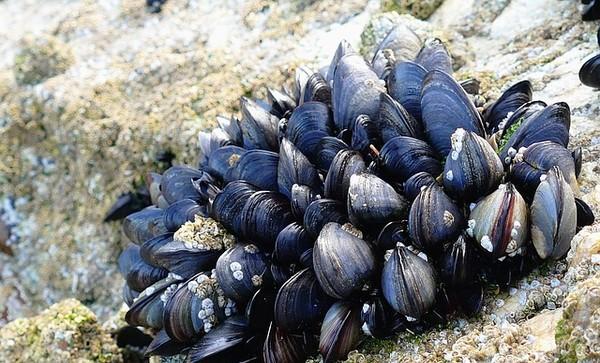
Scientists have found that marine shellfish have "infectious cancers". Pictured here are bay mussels. (Schematic/Free Gallery Pixabay)
Reporter Wu Meiyi/Editor
Scientists have found that the mytilus Trossulus cells in the northern hemisphere mutate to produce cancer, but have infected other individuals, even across the ocean, to the French purple shell clam (Mytilus Edulis) and the Chilean blue mussel (Mytilus Chilensis) in Argentina. Metzger, a scholar at the Pacific Northwest Research Institute in the United States, pointed out that after cancer cells continue to replicate and multiply, they may spread out through seawater and even infect other individuals across species, but the mechanism is still a mystery. The study was published in the journal November 5.
Michael Metzger, the first author of the study, found that the oil black shell clams that inhabit British Columbia have cell mutations, suffer from cancer with symptoms similar to leukemia, and after the menstrual lymph (Hemolymph) spreads throughout the body, it can be transmitted to other kinds. He collaborated with another national laboratory a few years ago to confirm through special genetic characteristics that the French purple shell clam and the Chilean blue mussel in Argentina are also infected with the same cancer.
Matzger mentioned that the oil black shell clam, which is the source of the disease, only appears in the northern hemisphere, usually growing along the coasts of North America and Europe, and cancer cells may be attached to ships or hidden in the ballast water of ships to spread across tropical equatorial regions. Similar phenomena are reported to occur in the sea mantis clam (Mya Arenaria) and the European bird tail clam (Cerastoderma Edule).
The team found that the golden carpet shell clam (Polititapes Aureus) was infected with another cancer, dating back to the Belgian wrinkled veget (Venerupis Corrugata) in Western Europe, proving that some cancers can be transferred between different species.
Madzger believes that cancer cells may be released through the filtration system of mussels and spread through seawater. (Photo/Photo: elife sciences)
Metzger believes that cancer cells may be released, inhaled and spread through the system of filtering debris in mussels, but the mechanism remains a mystery. He pointed out that although infectious cancers often cause individuals, it does not appear to have a devastating impact on the number of biological populations, "we don't really understand how big the threat is, but it doesn't seem to have wiped out entire populations."
It was pointed out that in 2006, researchers found that the endangered "Tasmanian devil" in Australia died of infectious cancer "Tasmanian Devil Facial Tumor Disease" (DFTD) and another similar cancer, and in the same year, it was found that domestic dogs also transmitted cancers that caused reproductive organ lesions. Academics have since reversed their perceptions and found six other types of cancer infected with shellfish in the past 10 years.
Some scientists worry that the wide distribution of infectious cancer species, even wild animals and important food resources for humans, may have serious impacts. Beata Ujvari, a scholar at Deakin University in Australia, believes that the reduced oxygen content and temperature of seawater are now a particularly preferred environment for cancer cells, and there are fears that infectious cancers may worsen the threat to marine life.
Jose Tubio, a scholar at the Center for Molecular Medicine and Chronic Diseases (CiMUS) in Spain, is very worried about the ecology, "Maybe a lot of shellfish have their own infectious cancers, but we don't know much about these effects." He pointed out that the intentional or unintentional movement of shellfish may introduce new forms of cancer, with serious consequences for local communities. It is understood that his research team found 5 new forms of infectious cancer in the cockle family, and the results have not yet been published.
Elizabeth Murchison, a scholar at the University of Cambridge, believes that the ability of some cancers to spread across species is "very surprising and worrying", although there is still no evidence that eating cancer shellfish affects human health, but "we should probably pay more attention to the possibility of cancer transmission through human activities." She also pointed out that understanding the transmission mechanism of infectious cancers can better understand the situation of cancer immune escape, which can be further applied to humans and other animals.